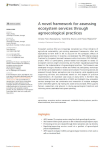Bassignana C.F., Bruno V., Migliorini P. (2025). A novel framework for assessing ecosystem services through agroecological practices. Frontiers in Agronomy, 01/01/2025, vol. 7, p. 1648022.
https://doi.org/10.3389/fagro.2025.1648022
https://doi.org/10.3389/fagro.2025.1648022
| Titre : | A novel framework for assessing ecosystem services through agroecological practices (2025) |
| Auteurs : | C.F. Bassignana ; V. Bruno ; P. Migliorini |
| Type de document : | Article |
| Dans : | Frontiers in Agronomy (vol. 7, 2025) |
| Article en page(s) : | p. 1648022 |
| Langues : | Anglais |
| Langues du résumé : | Anglais |
| Catégories : |
Catégories principales 06 - AGRICULTURE. FORÊTS. PÊCHES ; 6.4 - Production Agricole. Système de ProductionThésaurus IAMM PRATIQUE AGRICOLE ; AGROECOLOGIE ; SERVICE ECOSYSTEMIQUE ; EVALUATION ; GRECE ; ECOSSE |
| Résumé : | Ecosystem services (ESs) are increasingly recognized as critical indicators of agricultural sustainability, yet existing assessment frameworks often lack applicability at farm level or fail to account for the synergistic effects of agroecological practices. In response, we developed the APES (Agroecological Practices for Ecosystem Services) framework within the Horizon 2020 RADIANT project. APES is a participatory, practice-based tool designed to assess 22 ecosystem services (eight provisioning and fourteen regulating/supporting) based on the implementation of agroecological practices. The framework was developed through a literature review and refined via participatory workshops with farmers and stakeholders in Greece and Scotland. Provisioning services are assessed through farmer perceptions and crop diversity, while regulating and supporting services are evaluated based on the degree of practice implementation. An illustrative case study on dairy farms in Northern Italy demonstrates the practical application of APES and highlights how ecosystem services emerge from the combination and interaction of multiple strategies within diversified systems. By making ESs visible and actionable, APES supports farmers, researchers, and advisors in driving agroecological transitions and informing more sustainable food system planning. |
| Cote : | En ligne |
| URL / DOI : | https://doi.org/10.3389/fagro.2025.1648022 |







